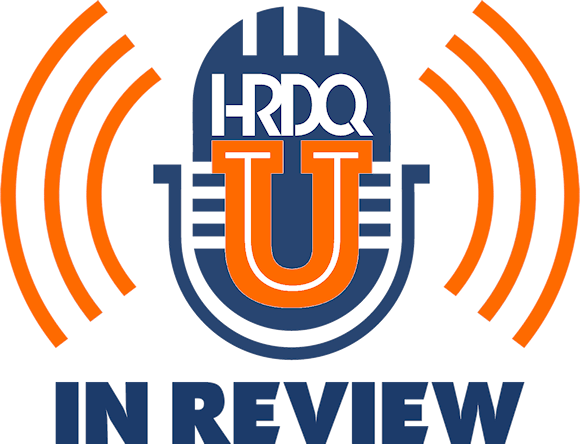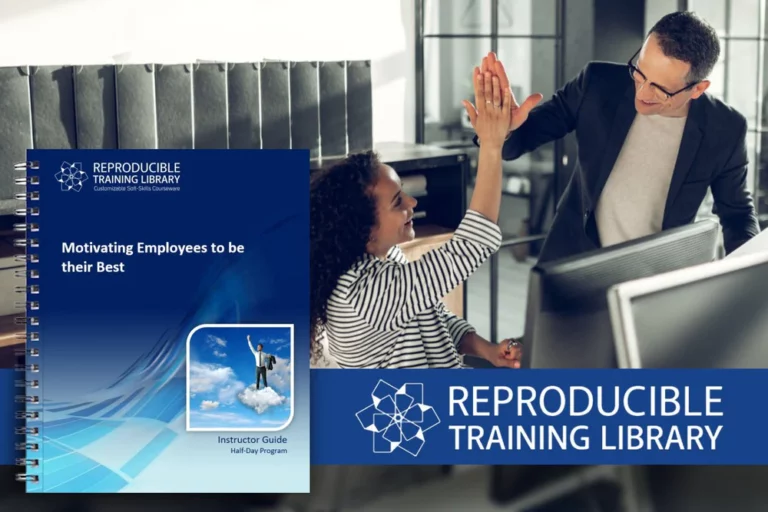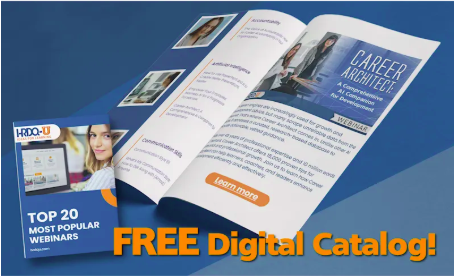

Explore the importance of providing effective employee performance review feedback. We’ll cover a range of topics, including the challenges of providing feedback, why it’s important, effective feedback impact, roadblocks, and strategies for presenting feedback. Listeners will gain new insights, tips, and guidance to help them provide more meaningful feedback and manage performance in their organizations. This can positively impact trust, communication, commitment, and loyalty among employees and the organization as a whole.
Join our host, Sarah, along with presenter Peter Garber, in an engaging discussion of his webinar, Providing Effective Feedback to Employees on all Performance Levels, where Peter goes into detail about how to help employees climb their career ladder to success.
00:09
Welcome to this week’s episode of the HRDQ-U in Review podcast, where we bring you the latest insights and practical tools for enhancing soft skills training in your organization. This webinar is brought to you by HRDQU.com, and I am your host, Sarah, learning events manager at HRDQ. And today we have Peter Garber joining us to take a deeper look into a recent webinar that he presented with us,
00:35
Providing Effective Feedback to Employees on all Performance Levels. Thanks so much for joining us today, Peter. Well, thank you, Sarah, for inviting me to participate in today’s podcast. My name is Peter Garber. I’m a retired human resource professional. I’ve worked for over 35 years for a Fortune 200 corporation, including 20 years in their corporate headquarters. I am the author of over 50 books on HR.
01:01
and business related topics, including my most recent work, 50 activities for performance feedback. Today, in addition to writing, I present webinars such as the one we’ll be discussing today in consult with businesses on a variety of HR topics. Well, great. Thanks for sharing with us a little bit about who you are and to get everybody up to speed here. And so with this webinar that we recently presented together,
01:28
providing effective feedback to employees and all that performance levels. Can you let everybody know what the key takeaways were for this event for anybody who maybe didn’t, you know, attend the webinar or as a recap for those that were able to join us that day? Yeah, that’s a good question. I believe that the questions asked at the conclusion of the program were excellent and they were great indicators of the key takeaways from the program.
01:56
For instance, one attendee asked if he should approach the leadership in his organization to make providing performance feedback to their direct reports a requirement for all managers and supervisors. I answered that I believe that he should. The program emphasized the importance of this level of communication from leadership of an organization to ensure that this feedback is provided consistently to all employees throughout an organization.
02:22
I believe without requiring this to happen, this feedback may not be consistently provided as was apparent in the case in this attendees organization. Receiving this feedback on a regular basis was obviously very important to this individual. I’m sure he was speaking for others in the organization as well. Another interesting question that you may remember concerned those workplaces in which there exists established pay grades or job classes.
02:51
that are the same for all incumbents working in certain jobs with annual raises administered across the board and not directly connected to their performance. This certainly can affect how employees perceive the connection between their performance and the reward systems in their organizations. Her question was if providing performance feedback was still relevant and meaningful in this type of situation. My answer was that even under these circumstances, it’s still
03:20
critically important that employees receive this feedback on their performance to be able to continue to grow and develop in their roles in the organization. The need to have effective supervisor communications concerning job performance will always be, it’ll always exist, it’ll always be important. And everyone needs to receive this feedback, even if it’s not directly connected to the rewards in their organization, which was the case in the individual that asked this question.
03:49
Yeah, you know, I’m sure it’s, you know, providing performance feedback to employees is really important for their growth and development within their organization. And so here, taking a step back and looking at the larger picture here, you know, what changes do you see happening in the L &D space right now? Well, I believe, as do most practicing, practicing in this field, that the impact of the pandemic had a significant and lasting impact on learning.
04:19
I greatly challenged the focus from face-to-face training or changed the focus from face-to-face training to remote learning. I see that trend continuing even though many of the restrictions have been lifted concerning the pandemic, but it did cause a paradigm shift in thinking about how L &D can be presented. I believe that we need to continue in our post-pandemic world.
04:44
define creative tools to deliver these experiences to audiences working remotely, or which can be delivered directly to their desktops in the workplace in an engaging and effective manner.
04:59
Yeah, this next question here is something that I like to ask all of our participants that come and join us on this webinar is, know, what exciting things are you up to next? And then we’ll jump into the content related questions. Okay. Well, today I’m mostly focused on developing projects which encourage people to be involved in some kind of skill building activity. I’m currently developing a project in which the reader explores their ability to recognize their perceived value in their organization.
05:28
and how to influence those perceptions.
05:33
Great, and so let’s take a look. What we did is we compiled all of the top comments and questions that we received from our webinar last week to the top most five questions here, the most asked and requested. So we’ll get to take a little bit deeper of a look here into those questions today and answer some of your questions in a little bit more depth. So this first one here is what…
05:59
level do you feel is the most difficult to provide performance feedback? That’s a good question too. And I did not offer my opinion in the webinar, as you remember. I kind of left it up to each person to make that decision themselves. And it can be a difficult question to answer because different supervisors’ perceptions concerning managing these different performance levels can vary.
06:28
But I personally feel that what I call middle performers, that’s the largest group in any organization, can be the most challenging because they often perceive themselves as performing at a higher level, making, them engaged in accepting the feedback you provide them even more challenging. Regardless, as I mentioned in the program, you need to continue to provide them with support and guidance in how they can continue to grow and develop in their job.
06:58
You need to be a champion, a supervisor needs to be a champion of middle performers, especially since they represent the largest group in your organization or any organization. They’re very important. And during the webinar, you didn’t focus on compensation. Do you believe that annual raises should be a part of performance feedback discussions? No, I don’t. I feel there’s already enough going on during that performance feedback session.
07:26
without adding compensation to the discussion and to the mix. Compensation changes are really a result of the performance feedback process and not really part of the feedback itself. is part of the process because that’s the end result of the process, they’re not really, compensation changes are really not feedback itself or not directly. Compensation changes can be covered in a subsequent meeting.
07:54
held between the supervisor and his or her direct reports after that formal performance feedback meeting and prior to the pay period in which these changes will be implemented and seen by the employee. have during my experiences over the years been surprised sometimes by not being informed by my supervisor what the changes are going to be and I learned about it in my next paycheck. supervisors really need to communicate better than that.
08:23
so that the employee hears it from them and doesn’t see it in their next paycheck.
08:30
And which do you think is more important, formal feedback or informal feedback? Well, Sarah, the short answer is that both are critically important and should complement one another, and I stressed that during the presentation. However, if I had to choose one over the other, I’d have to pick informal feedback, but only if it’s provided consistently throughout the performance year. This provides an employee with the opportunity to receive guidance and direction from his or her supervisor on a regular basis, which is very important.
09:00
And this can be a very important communications concerning employees overall job performance and development. But again, this informal feedback is much more effective when combined with a formal feedback process that we talked about during the program. And this next question I for you here is a bit jam-packed. So, you indicated that organizations should enforce a ratings distribution, such as the one that you described during the webinar.
09:29
Should there be exceptions for certain parts of an organization such as those achieving excellent results? And what about forcing organizations to rate 5 % or more into the lowest performance category if there truly are not that many poor performers? Yeah, this can be sometimes controversial in an organization if they’re saying that you’re required to rate a certain percentage of your employees in the lowest category. And I’m not an advocate for
09:58
advocate for forcing a segment of the workforce to be rated unsatisfactorily if that level of performance does not truly exist. And it’s possible that it might not, but it’s also possible that it may exist. So if it does exist, and whatever reason it’s not addressed, you’re actually condoning this poor performance by not addressing it. You know, most supervisors really don’t want to have to tell an employee that he or she is performing their job poorly.
10:24
However, supervisors are not fulfilling all the responsibility of their jobs by not addressing this problem. Sometimes they may need to be forced into accepting this responsibility by mandatory requirements for identifying poor performers. Rating a poor performer as satisfactory will only complicate a situation if this poor performance becomes apparent to everyone at a later time and there exists an inconsistent record of this person’s
10:54
true past performance.
10:57
And so employees sometimes strongly disagree with performance ratings that they receive causing dissatisfaction within the organization. Wouldn’t it be better to just do away with ratings and solely focus on providing better feedback to employees? Well, that’s an interesting question as well because it has been tried in some organizations and including the one that I worked for, but usually unsuccessfully in the situation that where we tried it.
11:26
It eventually, you know, did not serve us well. However, the philosophy of this approach does make sense. Organizations can get frustrated by all the pushback that they often receive from employees rated in the process. And they feel the greatest benefit of this process is really in the quality of the feedback, focusing on the feedback provided to employees by their supervisors concerned.
11:56
performance without putting these kinds of labels on their performance because people often respond to labels and aren’t satisfied with whatever level that they’ve been assigned. However, as I mentioned during the presentation, a performance feedback process drives other important processes in an organization such as identifying top talent or bonuses or raises, succession planning, promotions, et cetera. Without differentiating
12:25
performance levels, organization would have no formal documentation concerning performance levels to guide them in administering these other functions and processes. And what ends up happening is what I call secondary processes. In the absence of having that formal performance rating, companies have to kind of invent ways to distinguish.
12:51
levels of performance because you need to have those distinctions in order to administer those kinds of programs I just talked about. Well great, and then this last question that I have for you today before we wrap things up is where can listeners go to learn more about your work? can they connect with you? Well, think your website at HRDQ-U is a great resource for that and I believe it’s www.hrdqu.com
13:21
Is that correct? Correct, yes. Okay, well I think that would be a great resource. Yeah, make sure you go check back on HRDQU.com. We’ve had previous webinars that we’ve collaborated together with Peter on so can learn more about his work and what he has to share over there. And with that, thank you all for tuning in to this week’s episode of the HRDQ-U In Review podcast. Make sure that you check back for new episodes that are coming out regularly.
13:51
Thanks everyone and thanks Peter for your time today. Thank you very much.


Listen to this podcast event at no charge with your
HRDQ-U Free Access Membership
Explore the importance of providing effective employee performance review feedback. We’ll cover a range of topics, including the challenges of providing feedback, why it’s important, effective feedback impact, roadblocks, and strategies for presenting feedback. Listeners will gain new insights, tips, and guidance to help them provide more meaningful feedback and manage performance in their organizations. This can positively impact trust, communication, commitment, and loyalty among employees and the organization as a whole.
Join our host, Sarah, along with presenter Peter Garber, in an engaging discussion of his webinar, Providing Effective Feedback to Employees on all Performance Levels, where Peter goes into detail about how to help employees climb their career ladder to success.
[ PODCAST PLAYBACK ]
You must be signed-in with your membership account to access this content.
Enjoyed this podcast? Have suggestions on how we can improve? Please take our quick survey and receive a coupon for 15% OFF any of our individual membership plans.

*Instant 15% coupon available upon completion of survey.
Want to learn more? Become an Individual or Corporate member to watch this and hundreds more webinars!
Discover strategies for presenting performance review feedback to different performance levels and how to keep employees focused.

Peter R. Garber
Peter R. Garber is a retired Human Resource Professional with over 35 years of experience working for a Fortune 200 corporation. During his career, he held a variety of HR roles, including assignments at manufacturing facilities across the country, and later spent twenty years at the company’s corporate headquarters. Peter was also an adjunct instructor at the University of Pittsburgh Business School. He is the author of over 50 books and learning activities on HR and business-related topics. He has been invited to present seminars and webinars on numerous occasions based on his works and has made presentations at international conferences and colleges.
Peter worked on designing and improving the performance feedback processes for many years during his career. He developed and presented training programs on performance management for managers and supervisors in organizations throughout North America.
Get in touch with Peter at prgarber2110@yahoo.com

Training Tools for Developing Great People Skills
This event is sponsored by HRDQ. For 45 years HRDQ has provided research-based, off-the-shelf soft-skills training resources for classroom, virtual, and online training. From assessments and workshops to experiential hands-on games, HRDQ helps organizations improve performance, increase job satisfaction, and more.

Ongoing Performance Development Customizable Courseware
Learn how to utilize a range of various methods, including clear communication, brainstorming for development strategies, and gaining commitment for actionable improvement plans, to assist employees in reaching their maximum potential and attaining peak performance.
Buy at HRDQstore.com
Motivating Employees to Be Their Best Customizable Courseware
Help employees tap into their intrinsic motivation by providing them with valuable skills and techniques. This can help to create a strong sense of community within teams, empower them to take control of their work-related tasks, and encourage open communication in the workplace.
Buy at HRDQstore.comThe HRDQ-U In Review Podcast, brought to you by HRDQU.com, brings you the latest insights and practical tools for enhancing soft-skills training in your organization. As a learning community for trainers, coaches, consultants, managers, and anyone passionate about performance improvement, we interview subject matter experts and thought leaders from recent webinars they presented with us to take a deeper dive into the content they shared and answer all your questions. Join us as we explore new ideas and industry trends, share success stories, and discuss challenges faced by professionals.
The HRDQ-U In Review Podcast is intended for HR and training professionals, organizational development practitioners, and anyone interested in improving workplace performance and productivity.
New episodes of HRDQ-U In Review are released every week.
The length of the episodes varies, but they typically range from 15-30 minutes.
The podcast covers a wide range of topics related to HR and organizational development, including leadership development, team building, communication skills, conflict resolution, employee engagement, and more.
No, HRDQ-U In Review is completely free to listen to.
You can listen to any available HRDQ-U In Review Podcast right on our website at HRDQU.com via our embedded Spotify player on the related webinar page. In addition to our self-hosted option, you can find the HRDQ-U In Review Podcast on many of the popular streaming services, which are listed above.

Download our catalog of our top 20 most popular webinars.